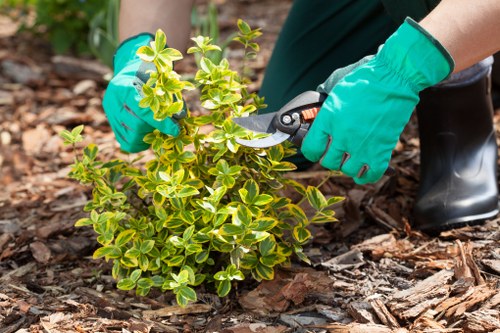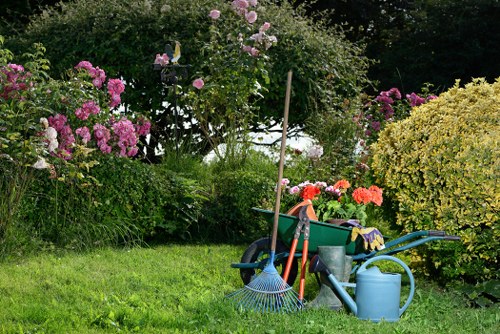Comprehensive Guide to Hedge Trimming in Fulwell

Maintaining a beautiful garden starts with well-trimmed hedges. In Fulwell, hedge trimming is not just about aesthetics; it's also essential for the health of your plants and the overall appeal of your property. Whether you're a homeowner looking to enhance your garden or a professional landscaper aiming to provide top-notch services, understanding the nuances of hedge trimming in Fulwell is crucial.
Fulwell's climate and soil conditions influence how hedges grow and how they should be maintained. Different types of hedges require specific trimming techniques to thrive. This article delves into the best practices for hedge trimming in Fulwell, ensuring your greenery remains lush and well-kept throughout the year.
Before starting any trimming project, it's important to assess the type of hedge you have. Common hedges in Fulwell include privet, yew, and boxwood, each with its unique characteristics. Knowing the specific needs of your hedge type will help you choose the right tools and trimming methods.

Why Hedge Trimming is Important
Regular hedge trimming offers numerous benefits beyond just maintaining an attractive garden. It promotes healthy growth by removing dead or diseased branches, allowing more sunlight and air to reach the inner parts of the hedge. This practice also prevents overgrowth, making it easier to manage and shape your greenery.
In Fulwell, where space can be limited, well-trimmed hedges act as natural boundaries, enhancing privacy and adding structure to your outdoor space. Moreover, a neatly trimmed hedge can increase the value of your property, making it more appealing to potential buyers.
Another significant advantage is the prevention of pests and diseases. Trimming helps eliminate hiding spots for insects and reduces the chances of fungal infections by improving air circulation around the plants.

When to Trim Your Hedges
Timing is crucial when it comes to hedge trimming. In Fulwell, the best times to trim hedges are during late winter or early spring before new growth begins. This timing minimizes stress on the plants and allows them to recover quickly as the growing season starts.
For hedges that bloom, such as lavender or flowering privet, it's advisable to trim them immediately after flowering. This ensures that the plants maintain their shape and encourages robust growth for the next season.
Regular maintenance trimming can be done several times a year depending on the growth rate of your hedges. In fast-growing varieties, more frequent trimming may be necessary to keep them in check.

Choosing the Right Tools
Having the right tools is essential for effective hedge trimming. Common tools used in Fulwell include hedge shears, electric trimmers, and loppers. For smaller hedges, hand-operated shears may suffice, while larger, more robust hedges may require powered tools for efficiency.
Sharp blades are critical for clean cuts, which help prevent damage to the plant and minimize the risk of infection. Regularly maintain your tools by sharpening blades and cleaning them after each use to extend their lifespan and performance.
Safety gear, such as gloves and protective eyewear, should also be part of your toolkit. Protecting yourself during trimming ensures that you can work effectively without injury.

Step-by-Step Hedge Trimming Guide
1. Assess Your Hedges
Before you begin, take a close look at your hedges. Identify any dead or diseased branches and plan the overall shape you want to achieve. Understanding the natural growth pattern will help you trim more effectively.
2. Gather Your Tools
Ensure you have all the necessary tools ready. This preparation saves time and makes the trimming process smoother.
3. Start Trimming
Begin by removing any dead or damaged branches. Cut at a slight angle to encourage water runoff and reduce the risk of disease. Shape the hedge gradually, making small adjustments rather than large cuts.
4. Maintain Consistent Shapes
Consistency is key to a professional-looking hedge. Use a string line or a guide to help keep your cuts even and your hedge symmetrical.
5. Clean Up
After trimming, collect all debris to prevent pests and diseases from taking hold. Proper disposal or composting of the clippings is recommended.
Local Fulwell Areas for Hedge Trimming Services
- Syon: Known for its lush gardens, Syon offers excellent opportunities for hedge trimming enthusiasts.
- Kew: With its botanical gardens, Kew is a prime area for professional hedge trimming services.
- Twickenham: A vibrant community where well-maintained hedges add to the neighborhood charm.
- Hampton: Hampton's historic homes benefit greatly from regular hedge maintenance.
- Richmond: Richmond's expansive parks require expert hedge trimming to keep them pristine.
- East Twickenham: This area values the aesthetic appeal of neatly trimmed hedges in residential areas.
- Fulham: Close to Fulwell, Fulham shares similar garden maintenance needs and styles.
- Chiswick: Chiswick's beautiful riverside homes often feature expertly trimmed hedges.
- Hammersmith: A bustling area where professional hedge trimming services are in high demand.
- Brentford: With a mix of residential and commercial properties, Brentford benefits from regular hedge care.
- Staines: Nearby Staines residents also seek high-quality hedge trimming services.
- Whitton: Whitton's community gardens require skilled trimming to maintain their appeal.
- Old Isleworth: Historic homes in Old Isleworth often have unique hedges that need specialized care.
Tips for Maintaining Healthy Hedges
- Regular Inspection: Check your hedges regularly for signs of disease or pest infestation.
- Proper Watering: Ensure your hedges receive adequate water, especially during dry seasons.
- Balanced Fertilization: Use the right fertilizers to provide essential nutrients without overfeeding.
- Pruning Techniques: Learn and apply proper pruning techniques to avoid damaging your hedges.
- Weed Control: Keep the area around your hedges free from weeds that compete for resources.
Common Mistakes to Avoid
Even experienced gardeners can make mistakes when trimming hedges. Avoid cutting too much at once, which can stress the plant. Instead, make gradual trims over time to maintain health and shape. Additionally, avoid trimming during extreme weather conditions, such as during frost or heatwaves, as this can harm the plants.
Another common mistake is neglecting regular maintenance. Sporadic trimming can lead to overgrown hedges that are harder to manage and more susceptible to disease.
Choosing a Professional Hedge Trimming Service in Fulwell
If maintaining your hedges feels overwhelming, consider hiring a professional service. Professionals bring expertise and the right tools to ensure your hedges are trimmed correctly and efficiently. When selecting a service in Fulwell, look for experienced providers with positive reviews and a portfolio of their work.
Ask about their trimming techniques and whether they specialize in your type of hedges. A reputable service will offer tailored solutions to meet your garden's specific needs.
Cost is also a factor to consider. While professional services may seem expensive upfront, the quality and longevity of the trim can save you money in the long run by reducing the need for frequent maintenance.
Eco-Friendly Hedge Trimming Practices
Adopting eco-friendly practices in hedge trimming not only benefits the environment but also promotes the health of your garden. Use manual tools when possible to reduce energy consumption. Recycle or compost the trimmings instead of sending them to landfill, which decreases waste and enriches your soil.
Opt for organic fertilizers and pest control methods to maintain a natural balance in your garden. These practices help preserve the local ecosystem and ensure your hedges are free from harmful chemicals.
Seasonal Hedge Trimming Tips
Spring
Spring is an ideal time to give your hedges a fresh start. Remove any winter damage and shape the new growth. This trimming encourages strong, healthy development throughout the growing season.
Summer
During summer, focus on light trimming to control growth and maintain shape. Ensure your hedges are well-watered and protected from excessive heat to prevent stress.
Autumn
Autumn trimming helps prepare your hedges for the winter months. Cut back any overgrown branches and clean up fallen leaves to reduce the risk of mold and pests.
Winter
Avoid heavy trimming during winter as it can harm the plants. Instead, perform minor maintenance if necessary and plan for more significant trimming in the spring.
Understanding Hedge Types in Fulwell
Privet
Privet is a popular hedge choice in Fulwell due to its dense growth and ease of maintenance. It responds well to trimming, allowing for a variety of shapes and styles.
Yew
Yew hedges are known for their longevity and rich green color. They require careful trimming to maintain their form and prevent overgrowth.
Boxwood
Boxwood is favored for its fine texture and ability to be shaped into intricate designs. Regular trimming keeps boxwood hedges neat and visually appealing.
Hornbeam
Hornbeam hedges are durable and provide excellent privacy. They can withstand heavy trimming and are suitable for creating formal garden structures.
Laurel
Laurel hedges are evergreen and known for their glossy leaves. They require consistent trimming to control their size and promote healthy growth.
Beech
Beech hedges offer beautiful foliage and seasonal color changes. Proper trimming ensures they remain dense and well-shaped.